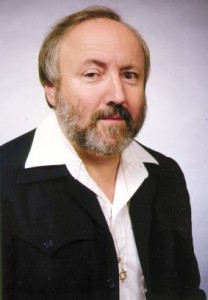
Dr. Arnold Fruchtenbaum
Arnold was born September 26, 1943, in Siberia, Russia, after his father was released from a Communist prison. Even though he is Jewish, his father was accused of being a Nazi spy when he fled Poland from Hitler.
The Fruchtenbaum family escaped from behind the Iron Curtain with the help of the Israeli underground. They resided in Germany from 1946 to 1951, where Arnold received orthodox Jewish training.
The Fruchtenbaum family immigrated to Brooklyn in 1951. In that year they first came in contact with the American Board of Missions to the Jews (now Chosen People Ministries).
Shortly after that, at the age of 13, Arnold G. Fruchtenbaum became a believer in the Messiahship of Jesus.
Although his father strongly opposed Arnold’s beliefs, he did allow Arnold to continue to associate with and learn from other Jewish believers until the family left Brooklyn to move to Los Angeles in 1958. But once in Los Angeles, Arnold was forbidden to read the Bible, attend Christian meetings, or have anything to do with Messianic Jewish groups.
Under these difficult circumstances, Arnold continued to maintain contact with Jewish believers and to walk with the Lord as best he could.
Upon his graduation from Hamilton High School (1962), he was informed by his father that he would have to leave home because of his beliefs.
In September 1962, Arnold began undergraduate education at Shelton College in Ringwood, New Jersey. He transferred to and graduated from Cedarville College (now Cedarville University) in Ohio with a Bachelor of Arts degree in Hebrew and Greek in 1966.
He moved to Israel in July 1966 and began studying archaeology, ancient history, historical geography, and Hebrew at the American Institute of Holy Land Studies (now Jerusalem University College) and at the Hebrew University in Jerusalem. During this time he became an eyewitness to the events of the Six-Day War.
In September 1967, he enrolled at Dallas Theological Seminary, majoring in Hebrew and Old Testament. He also began working as a missionary with the American Board of Missions to the Jews. He graduated in 1971 with a Master of Theology degree.
In June 1968, he was married to Mary Ann Morrow, a graduate of Gordon College. In 1971, he and his wife went to Israel for two years, settling in Jerusalem. Their main activity consisted of working with the local Messianic congregation and the training of young Israeli believers for service. His activities for the Messiah drew the anger of the religious authorities in Jerusalem. These authorities eventually applied enough pressure upon government officials to force the Fruchtenbaums to leave Israel in 1973.
For the next two years he was a minister for the American Board of Missions to the Jews at its headquarters in Englewood Cliffs, New Jersey, and editor of The Chosen People.
In 1976, he joined the staff of The Christian Jew Foundation as Associate Director of the largest Messianic Jewish broadcasting ministry in the world.
Frequently in demand as a conference speaker and teacher, he has traveled widely in Europe, Israel, and the United States, becoming intimately acquainted with the Messianic Jewish movement in all its forms and with all its struggles.
In the summer of 1976, Arnold, along with others in the field of Jewish missions, discussed the problem of the lack of discipleship and intensive biblical and theological training of Jewish believers. The early concepts of ARIEL MINISTRIES were born at that time. In December 1977, after a year-and-a-half of prayer and much encouragement from like-minded Jewish believers, ARIEL MINISTRIES became a reality based on the principles of evangelism and discipleship. Arnold now serves as the director of the ministry.
In 1989, Arnold completed his Ph.D. at New York University.
ARIEL MINISTRIES has established branches which are now independent congregations in Los Angeles and San Diego, California, and Portland, Oregon, as well as Tel Aviv and Beersheva, Israel, and Kiev, Ukraine. At the present time, ARIEL MINISTRIES has missionaries in the United States, Canada, and Europe, as well as conducting outreach programs in other countries. It also has a summer discipleship camp, a home-study correspondence course, and an extensive teaching ministry via tapes and manuscripts.
He is the author of eight books: (1) Israelology: The Missing Link in Systematic Theology; (2) The Footsteps of the Messiah: A Study of the Sequence of Prophetic Events; (3) Jesus Was A Jew; (4) Hebrew Christianity: Its Theology, History, and Philosophy; (5) Biblical Lovemaking: A Study of The Song of Solomon; (6) A Passover Haggadah for Jewish Believers; (7) Messianic Christology; and (8) the extensive Historical-Geographical Study Guide of Israel, which he uses when leading groups through the Land. He has also contributed articles in a number of books, including: Basic Theology: Applied; When the Trumpet Sounds; Issues in Dispensationalism; The Death of the Messiah; Jewish Identity and Faith in Jesus; Dictionary of Premillennial Theology; A Bible Handbook to the Acts of the Apostles; The Fundamentals for the 21st Century; and, A Biblical Theology of the Church.

